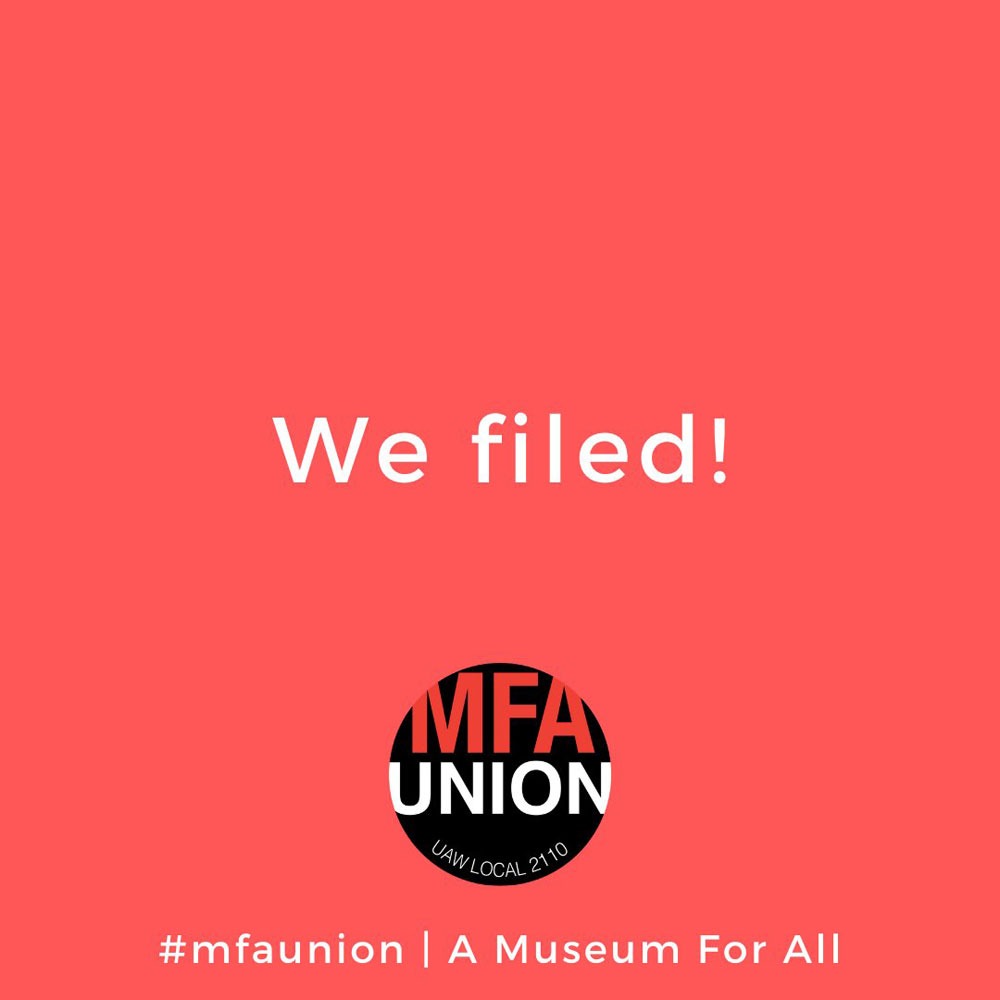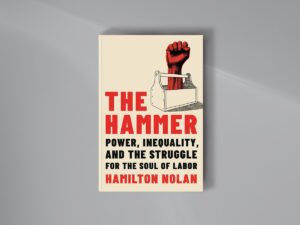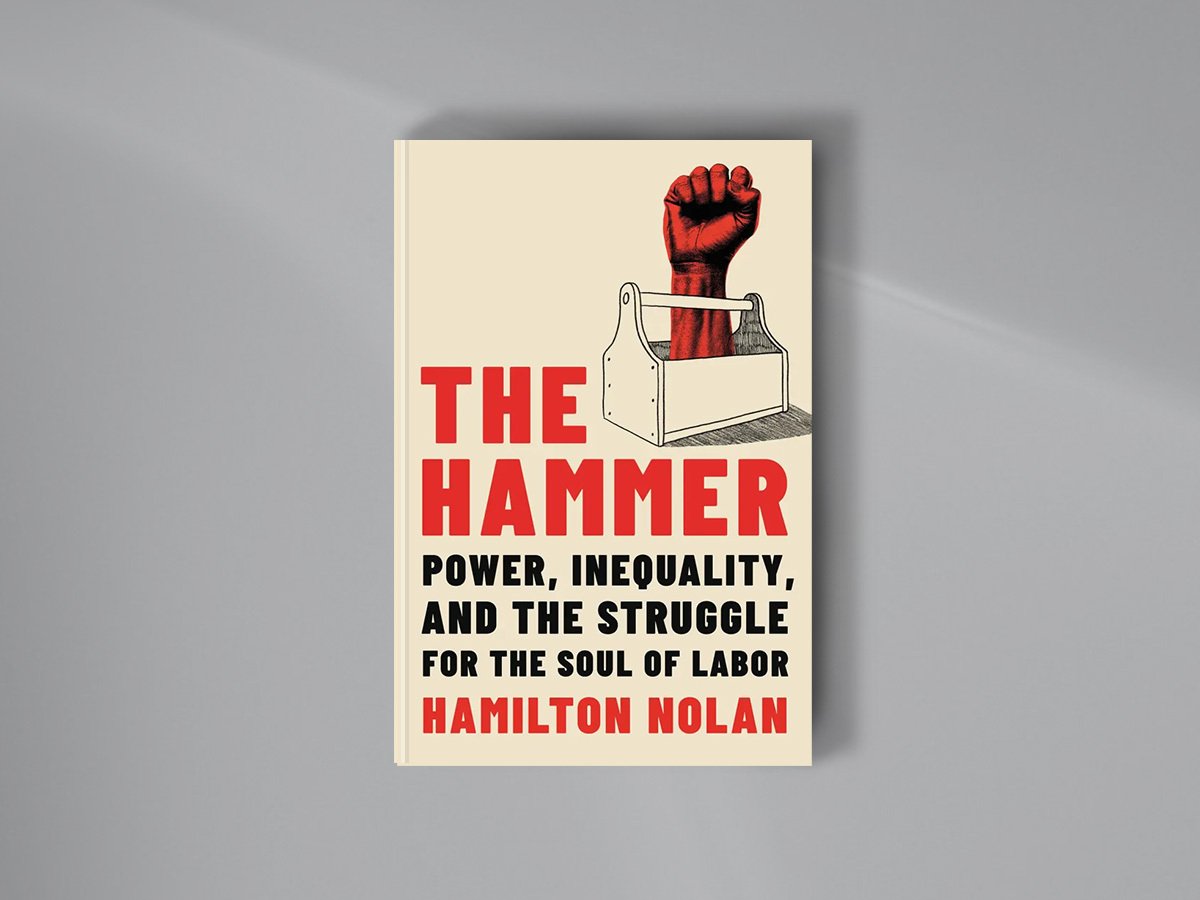
November 20, 2020; Boston Globe
“Employees at the Museum of Fine Arts have voted overwhelmingly to unionize, opening a new era of collective bargaining at the city’s flagship museum,” reports Malcolm Gay in the Boston Globe.
The vote was 133 employees in favor and 14 against. As a result of the vote, employees across 30 departments will join United Auto Workers Local 2110, which represents about 5,000 technical, office, and professional workers, including workers at New York City’s Museum of Modern Art (MoMA).
As Gay points out, the unionization campaign in Boston is part of a “broader national push among cultural workers to organize.” According to Gay, unionization campaigns can currently be found taking place at the Carnegie Museums of Pittsburgh, the Milwaukee Art Museum, and Maine’s Portland Museum of Art.
One recent unionization effort was in Philadelphia, where art museum workers at the Philadelphia Museum of Art voted in August to unionize by a similarly overwhelming margin (181 votes in favor versus 22 against), in their case joining the American Federation of State, County, and Municipal Employees (AFSCME)’s district council 47.
This wave of unionization took off in 2019. As NPQ covered, in 2019 art workers joined unions at the Los Angeles Museum of Contemporary Art (MOCA), the New Museum of Contemporary Art, and the Guggenheim Museum in New York City, the New Children’s Museum in San Diego and the Frye Museum in Seattle, among others. In early 2020, before the pandemic hit, workers at The Shed in New York City also unionized.
It was initially uncertain if the unionization wave would continue amid the pandemic, but it has not only been sustained, but accelerated. The nonprofit unionization wave extends beyond art museums, of course. As early as May, the Nonprofit Professional Employees Union was reporting a surge of demand from workers seeking union protection in an unusually uncertain economy.
In an interview in Jacobin, Nicole Cook, a program manager for academic partnerships at the Philadelphia Museum of Art, explains how the pandemic first froze organizing, but then accelerated it:
Sign up for our free newsletters
Subscribe to NPQ's newsletters to have our top stories delivered directly to your inbox.
By signing up, you agree to our privacy policy and terms of use, and to receive messages from NPQ and our partners.
We were all so traumatized and afraid; we didn’t know what was going to happen with our museum or the city or the world. It took us another two or three weeks at least before we restarted organizing conversations. And at that point, we weren’t really sure how people were feeling, if people even within our own committee had any change of heart—everything was so uncertain. At that time, the museum was committing to keep us employed through the end of June, which was, of course, the right thing to do.
When we restarted conversations, we very quickly realized everyone was still on board, maybe even more so than before. The realization that none of us had any say in what was happening at the museum recommitted people to our organizing.
Art museum managers’ responses to union campaigns vary. In some instances, as with MOCA in Los Angeles, managers have agreed to voluntarily recognize the union when faced with signed union cards indicating that a majority of workers have expressed a desire to be part of a union.
In Philadelphia and Boston, by contrast, museum managers have insisted the union prove its support in an election process. In Philadelphia, the museum even hired Morgan Lewis, viewed as a union-busting law firm that advises employers on how to limit membership in unions. In Boston, it is unclear who is advising management, but according to Maida Rosenstein, president of Local 2110, museum managers are seeking to limit who the union represents, challenging the ballots of 41 workers, including some curators and conservators, arguing these workers shouldn’t be included in the union. Those ballots were not opened in the vote counting as a result.
It is no secret that museums face extraordinarily hard times, with many museums that reopened this summer facing possible reclosure due to a surging pandemic. So far, Boston museums have been allowed to stay open, but with restricted entry rules.
Notwithstanding these challenges, workers believes the union will benefit them and the museum in the long run. Emma Rose Rainville, a development officer for the museum, tells Gay that the union “is going to make the MFA stronger.” She adds that, “Generations of employees will have ways to stick together and support one another.”
Kat Bossi, executive assistant to the head of exhibitions, also notes that even amid the pandemic, she believes that the union could have helped during last summer’s round of layoffs. “We understand it’s not a cure-all, but at the very least we can have a say and fight to get what the staff deserves,” she says.
For his part, Museum of Fine Arts director Matthew Teitelbaum says that art museum management respects the vote and is “committed to working with the union moving forward.”—Steve Dubb













